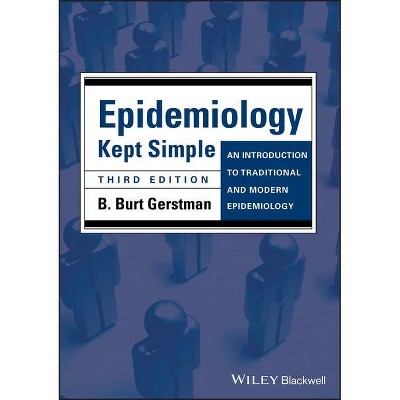Epidemiology Kept Simple - 3rd Edition,Abridged by B Burt Gerstman (Paperback)

Similar Products
Products of same category from the store
AllProduct info
<p/><br></br><p><b> Book Synopsis </b></p></br></br><p><i>Epidemiology Kept Simple</i> introduces the epidemiological principles and methods that are increasingly important in the practice of medicine and public health. With minimum use of technical language it fully explains terminology, concepts, and techniques associated with traditional and modern epidemiology. Topics include disease causality, epidemiologic measures, descriptive epidemiology, study design, clinical and primary prevention trials, observational cohort studies, case-control studies, and the consideration of random and systematic error in studies of causal factors. Chapters on the infectious disease process, outbreak investigation, and screening for disease are also included. The latter chapters introduce more advanced biostatistical and epidemiologic techniques, such as survival analysis, Mantel-Haenszel techniques, and tests for interaction.</p> <p>This third edition addresses all the requirements of the American Schools of Public Health (ASPH) Epidemiological Competencies, and provides enhanced clarity and<br /> readability on this difficult subject. Updated with new practical exercises, case studies and real world examples, this title helps you develop the necessary tools to interpret epidemiological data and prepare for board exams, and now also includes review questions at the end of each chapter.</p> <p><i>Epidemiology Kept Simple</i> continues to provide an introductory guide to the use of epidemiological methods for graduate and undergraduate students studying public health, health education and nursing, and for all practicing health professionals seeking professional development. </p><p/><br></br><p><b> From the Back Cover </b></p></br></br><p><b>Epidemiology Kept Simple</b></br> AN INTRODUCTION TO TRADITIONAL AND MODERN EPIDEMIOLOGY</br> THIRD EDITION</br> B. Burt Gerstman <p><i>Epidemiology Kept Simple</i> introduces the epidemiological principles and methods that are increasingly important in the practice of medicine and public health. With minimum use of technical language it fully explains terminology, concepts, and techniques associated with traditional and modern epidemiology. <p>Topics include disease causality, epidemiologic measures, descriptive epidemiology, study design, clinical and primary prevention trials, observational cohort studies, case-control studies, and the consideration of random and systematic error in studies of causal factors. Chapters on the infectious disease process, outbreak investigation, and screening for disease are also included. The latter chapters introduce more advanced biostatistical and epidemiologic techniques, such as survival analysis, Mantel-Haenszel techniques, and tests for interaction. <p>This third edition addresses all the requirements of the American Schools of Public Health (ASPH) Epidemiological Competencies and provides practical exercises, case studies and real world examples to help develop the necessary tools to interpret epidemiological data and prepare for board exams. <p><i>Epidemiology Kept Simple</i> continues to provide an introductory guide to the use of epidemiological methods for graduate and undergraduate students studying public health, health education and nursing, and for all practicing health professionals seeking professional development.<p/><br></br><p><b> Review Quotes </b></p></br></br><br><p>This edition does a good job of updating the previous editions, which have not covered the ASPH epidemiology competencies. (<i>Doody's</i>, 21 February 2014)</p><br><p/><br></br><p><b> About the Author </b></p></br></br><p><strong>B. Burt Gerstman</strong>, Professor in Department of Health Science, San Jose University, CA USA.
Price History
Price Archive shows prices from various stores, lets you see history and find the cheapest. There is no actual sale on the website. For all support, inquiry and suggestion messagescommunication@pricearchive.us




















